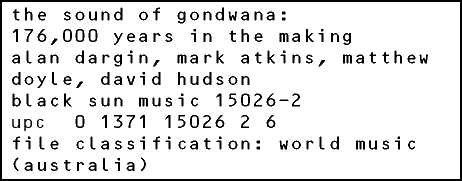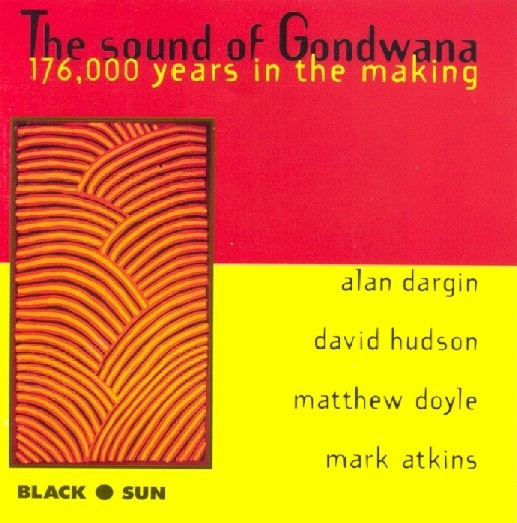|
|
||||||||||||||||||||||||||||||||||||||||||||||||||||
 
Die australischen Ureinwohner verzichteten bewusst auf Ackerbau und Viehzucht. Das Land war ihnen heilig. Neuere archäologische Forschungen scheinen zu bestätigen, dass die Kultur der Aborigines, die sich u.a. in Felszeichnungen erhalten hat, gut 50.000 Jahre alt, der Kontinent jedoch wenigstens 176.000 Jahre von Menschen bewohnt ist. Das Hauptmusikinstrument vieler Aboriginesvölker, ein von Termiten hohlgefressener Eukalyptusstamm, erlebt bei uns im Westen unter dem Namen 'Didjeridu' (auch Didgeridoo, kurz „didge“) einen wahren Boom. Bei den Ureinwohnern hat das Instrument entsprechend den vielen verschiedenen Sprachen viele Namen. So simpel das Rohr aussieht - wird es von Könnern wie den Aboriginal-Musikern David Hudson, Matthew Doyle, Alan Dargin und Mark Atkins geblasen, entstehen Klangwelten von unerschöpflicher Vielfalt. An den Produktionen wirkten mit: Michael Atherton (Professor und Leiter/Gründer der Musikfakultät der Universität von Western Sydney), Steve Roach u.a Gondwana ist ein urzeitlicher Kontinent, von dem das heutige Australien nur ein Teil war Einige Felszeichnungen der Aborigines sind gut 30.000 Jahre älter als die der französischen Höhlenmenschen - und die galten lange als das älteste Zeugnis menschlicher Kunst überhaupt. Die vier Aborigines-Didjeridumeister Australiens, die Perkussionisten Michael Atherton und Mark Atkins und der Elektronik-Spacemusiker Steve Roach führen uns zu den Ursprüngen der Menschheit. the projectTo the amazement of the world, on September 24, 1996, the history of humanity and the Australian Aborigines were rocked; changed fundamentally, forever. The Sydney Morning Herald reported "a team of scientists...had found a rock art site in the Northern Territory known by local Aborigines as Jinmium, that was at least 76,000 years old." and that "They also found evidence, in sediments below the art, that humans had first occupied the continent between 116,000 and 176,000 years ago." When you listen to this recording you are making contact with the oldest continuous culture on earth. The Sound of Gondwana is dedicated to that far distant forebear of these four indigenous Australian artists who engraved the rocks some 75,000 years ago and, in that single act, expressed the deep creative impulses which separate humanity from all other living creatures on our tiny, blue planet. The recording opens with a fitting piece by Alan Dargin, The Call, using sounds of the didjeridu to evoke the vastness and loneliness of the Australian outback. Set against delicate washes of synthesizer, the didjeridu wails and stutters like some ancient and mysterious presence. Mark Atkins continues the didjeridu journey with a more vibrant, aggressive approach to the instrument with Dance This Time Around. With its sharp and insistent rhythm, its animal cries and intermittent songsticks, it is a reminder that the didjeridu is often used as a musical backdrop for both social and ceremonial dancing. Hand Stencils by Matthew Doyle sets the didjeridu against a range of percussive instruments capturing those ceremonial moments when ochres are ground and prepared for the making of hand stencil paintings on the walls of caves. The recording is completed with pieces from David Hudson which are deeply rooted in traditional playing.
the artistsThe indigenous Australian artists represented on this compilation are at the vanguard of didjeridu playing, each with an identifiable style and seemingly endless capacity for invention. A cultural ambassador for Australia, world renowned didjeridu master Alan Dargin learned to play the didj at the age of five. Taught by his grandfather, he learned on a didj made from a now extinct species of bloodwood tree, a eucalyptus which bleeds red sap when cut. He has played with orchestras, jazz groups and techno musicians. Alan is also an actor. One of his goals is to make the didjeridu a respected and understood instrument on the world stage, encouraging audiences to appreciate the didjeridu as having both a sacred and a secular role in indigenous Australian music. Mark Atkins, a descendant of the Yamitji people, is well-known throughout Australia as a storyteller, composer, songwriter, and painter, as well as a masterful didjeridu player. Matthew Doyle is of Aboriginal/Irish descent to the Yuwalarai people and has been adopted into traditional families in the Northern Territory and Queensland. His innovative intermingling of animal noises, rhythmic cries and driving didjeridu can be heard on Lyrebird (15023-2). David Hudson, a member of the Tjapukai people, has a profound understanding of the didjeridu as demonstrated on his recordings Rainbow Serpent (13096-2), and the highly acclaimed ground-breaking experiment in the creative possibilities, Woolunda: Ten Solos for Didgeridoo (13071-2). biography - hudsondiscography - hudsondiscography - dargindiscography - doyletracklist
|
||||||||||||||||||||||||||||||||||||||||||||||||||||
|
|
||||||||||||||||||||||||||||||||||||||||||||||||||||
 |


